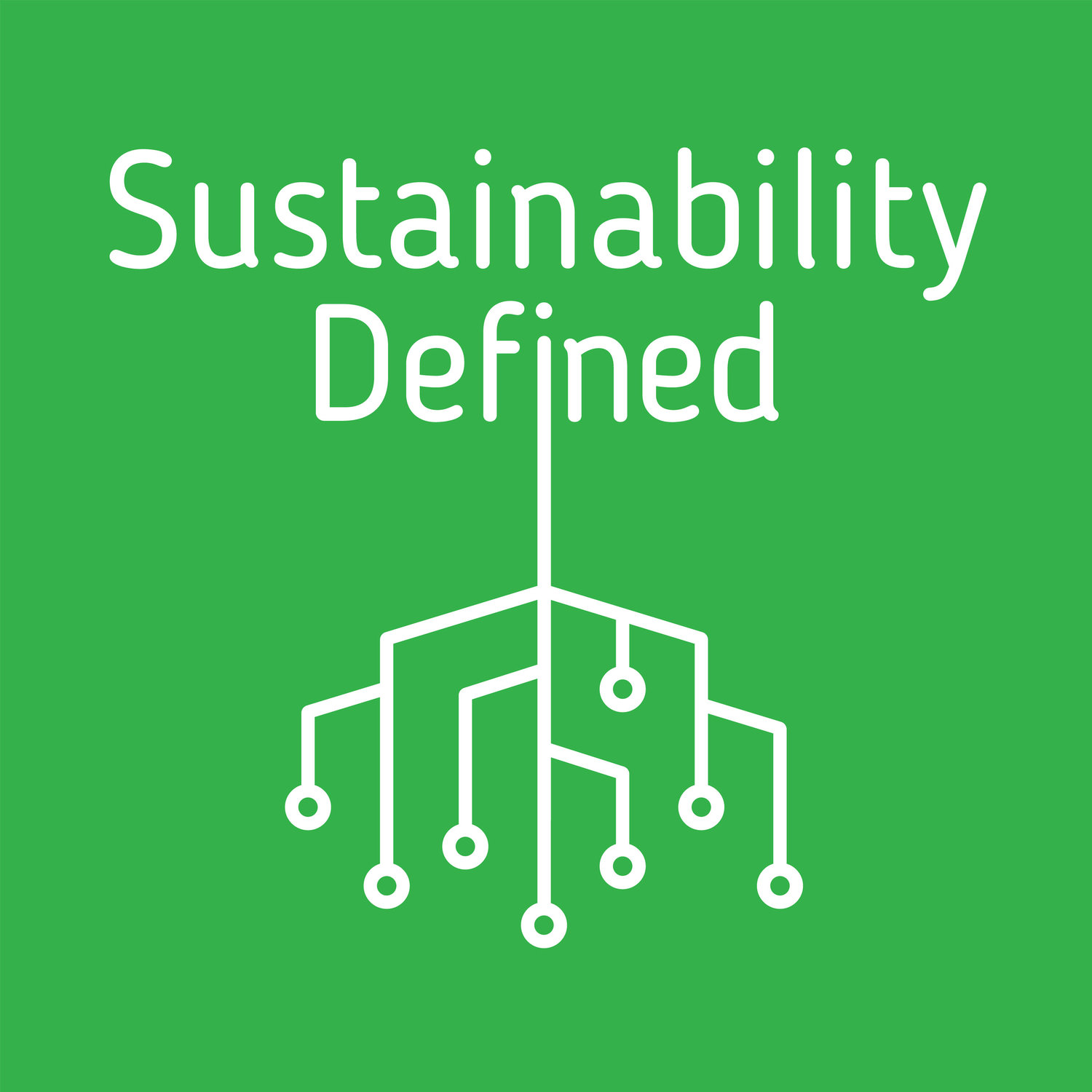Episode 18: Sustainable Apparel with Jeff Denby (The Renewal Workshop)
You probably have some awesome retro clothes in your closet because you want to get as much use out of your clothes as you can. We're with you, but unfortunately, in the USA, 80 pounds of apparel per American per year ends up in the landfill. Luckily, there is a superhero to the rescue. Our guest this episode, Jeff Denby, is the co-founder of a business called The Renewal Workshop that is going to take this linear model and make it circular. It partners with apparel brands to take returned and damaged clothing, clean it and repair it at a factory in Oregon, and then resell it. No matter the state the clothes are in, when they are sent to The Renewal Workshop, there is a no landfill guarantee. After this episode, we guarantee that you'll never look at clothes the same way again.
Learn how more businesses are going green here!
Episode Intro Notes
What We’ll Cover
The apparel industry by the numbers
Resource use and pollution in the apparel industry
Physical apparel waste
How to be a responsible consumer of apparel
The Renewal Workshop & Jeff Denby
Conventional Apparel Production Numbers
The average American spends about a thousand dollars on apparel per year. The total global apparel market is a little over a trillion dollars and the U.S. makes up about $225 billion of it.
The apparel company with the highest amount of sales was Christian Dior at $41.6 billion in sales in the last year. It’s bottom line was helped by luxury brands such as Dom Perignon, Veuve Clicquot, Givenchy, and De Beers (I don’t know whether to be happy or sad that I’ve never heard of any of these. I’m going to go with happy). Nike wasn’t far behind with $34 billion in sales. The largest clothing retailers in the world are Zara and H&M with $22.81 and $21.11 billions of dollars in sales per year respectively
In a typical year, there are 1.5 jeans per person sold in the U.S.
Don’t people know jeans are that magical piece of clothing that you can wear multiple times without washing and lasts for years? In fact, people now buy the things faded! Might as well wear them for a while and get the natural fade.
22 billion new clothing items are bought by Americans each year with only 2 percent of those clothes being domestically manufactured. We’ve lost 800,000 apparel jobs in the past couple decades.
There are close to six million people employed globally and over 180,000 companies engaged in the manufacturing of apparel.
Note how this is just manufacturing.
55% of apparel manufacturing locations are in northeast Asia with China making up most of that.
Apparel is the largest employer of women worldwide but only 2% of them are paid a living wage.
There’s been a history of bad working conditions for these workers.
As recently as 2013, labor conditions were in the news when 1,100 garment workers died when a factory collapsed in Bangladesh. This was a day after cracks were discovered in the building and the workers were ordered to return to work.
The Asia Floor Wage Alliance put out a report in 2015 detailing bad conditions including accusing Walmart of profiting from apparel made in Cambodian factories where workers work in intense heat 10 to 14 hours a day.
There have been initiatives to remedy this
The Accord on Fire Building and Safety is led by H&M. Its inspections of 1,600 factories identified 108,000 issues, most of which have now been fixed.
Gap has a Code of Vendor Conduct that requires workers to be paid a minimum wage or a wage that meets local standards.
The Sustainable Apparel Coalition was formed. It’s a global alliance started by Walmart and Patagonia in 2009 that now includes 175 members, making up 40% of the apparel industry. They have developed something called the “Higg Index,” which is a suite of self-assessment tools that measure environmental and social impacts and identify areas for improvement. The process delivers a holistic overview of sustainability performance of a unique product or company. However, not all are using the index and those that do, usually don’t make it public.
Conventional Apparel Resource Use and Pollution
“The clothing industry is the second largest polluter in the world ... second only to oil.”
I love how Eileen Fisher, a clothing industry magnate, made the statement upon receiving an award from the environmental organization Riverkeeper for her commitment to environmental causes. She runs a self-named women fashion brand with like $300 million in annual sales.
Her company is already using 84% organic cotton, 68% organic linen, and is reducing water use and carbon emissions with the hope of being carbon positive and making its supply chain sustainable by 2020.
Water. The production of one t-shirt requires 700 gallons of water and the production of one pair of jeans requires 1,500 gallons of water.
To Levi’s credit, they did a life cycle analysis of their jeans and tried to find where water use could be reduced. They saw 49% of the water used was in growing the cotton, 45% was used in the customer washing the jeans, and 6% was used in its actual manufacturing. Levi’s joined forces with other brands and retailers to form the Better Cotton Initiative to encourage more sustainable cotton growth around the world. With its Water<Less initiative, it rethought how it made its jeans and has saved 1 billion gallons of water since 2011. It intends to make 80% of jeans with this process by 2020, which would be up from 25% today.
CO2. The amount of CO2 emitted to produce one pair of jeans is 71 pounds. In other words, the amount of carbon dioxide generated in producing one pair of jeans is equivalent to driving 78 miles.
Pesticides. 25% of all pesticides used in the United States are used on cotton crops.
Cotton represents about half of the fiber used to make textiles and much of the rest is made of synthetic, factory-made fibers (think polyester and nylon).
Toxic dyes.
Conventional Apparel Waste
Each year 80 billion pieces of clothing are produced worldwide. Only about 15% of clothing and shoes in the United States are recycled - so the leftover 85% of usable materials are being sent to the landfill. That ends up to 70 pounds of waste per U.S. citizen.
Natural fibers can’t be composted since they’ve been bleached, dyed, printed on, etc. When put into improperly sealed landfills, the chemicals can leach into groundwater. Synthetic fibers have the same environmental drawbacks and are made from petroleum so they can take thousands of years to degrade.
EPA estimates that diverting all of these often-toxic trashed textiles into a recycling program would be the environmental equivalent of taking 7.3 million cars and their CO2 emissions off the road.
According to the Council for Textile Recycling, charities sell only about 20% of the clothing donated to them at their retail outlets. The rest get sold to textile recyclers that then ship it overseas. So much secondhand clothing is flowing into Africa that it’s hurting local manufacturers and creating dependency. In early 2015, a summit of East African leaders actually proposed a ban on the importation of second-hand clothing.
The waste issue has not been helped by the emergence of fast fashion (think H&M, Zara, Mango, Forver 21, Topshop).
Americans buy almost twice as much new clothing as they did just twenty years ago, averaging a new piece of clothing every four to five days.
The fast fashion brands are trying to help their image. H&M has released a goal for 2020 that all of the cotton used must come from sustainable sources.
H&M also released a Conscious collection that has clothing items that are made from 100% organic cotton and recycled fabrics
In 2013, H&M released a garment collection initiative to do their part in reducing the amount of waste materials that end up in the landfill
Since the launch of the initiative, more than 32,000 tonnes of garments have been donated to be recycled or reused. H&M promises one of three fates for your donated clothes: 1) reused in a different capacity; 2) resold in second-hand stores; or 3) recycled into new textile.
According to H&M’s sustainability director, only about 0.1% of all clothing collected by charities and take-back programs is recycled into new textile fiber.
How to shop with your morals in mind
Focus on the source of the clothing that you’re buying - including where the materials originally came from and where the clothing was manufactured.
Most all retailers have a commitment of some sort now but it’s hard to know exactly whether your specific shirt was made in a factory with decent conditions.
Check out companies like Jeff Denby’s other brand PACT which focuses on creating apparel that is not made in sweatshops, is ethically produced, uses non-GMO organic cotton, and non-toxic dyes
See if the clothing is made from recycled materials and thus is getting close to the holy grail of closed-loop sourcing.
Full closed-loop technology is at least ten years away at best according to the Sustainable Apparel Coalition. The problem right now is once cotton has been dyed, treated, or blended, it’s difficult to break it down and re-weave it.
Who’s trying to change the apparel industry
The Renewable Workshop’s tagline is that they “Partner with the world’s best-loved apparel brands to bring their big piles to our factory where they’re refurbished to become Renewed Apparel”
It works like this: Instead of the store putting a damaged shirt into a warehouse to sit forever, The Renewable Workshop will take it, fix it, and make it into a useful product.
Every garment that makes its way into The Renewable Workshop’s factory in Oregon will leave as a newly repaired and functional piece of clothing, with a no landfill guarantee.
The Renewable Workshop is focusing on the backend of clothing production - something the consumer never sees or thinks about - what happens to the clothing that is not perfect
It’s like the ugly/imperfect produce initiatives that are working to end food waste - but for clothing
Take a defective shirt and make it work again - avoid the landfill and create a product that can be used for what it was originally was created to be
Jeff Denby
Received his BASc in Mechanical Engineering from the University of Waterloo
Went on to receive his MBA in Social Responsibility from the University of California, Berkeley, Haas School of Business
While pursuing his MBA, Jeff worked on brand and sustainability programs for Gap, Jack Daniel’s and eBay.
Before founding The Renewal Workshop, Jeff was the co-founder of PACT - an apparel brand that aims to change the apparel industry for good.
PACT makes organic cotton basics in a transparent supply chain that aims to improve the lives of the farmers who grow the organic cotton and the workers who make the clothing.
Now, PACT is available in more than 500 retail outlets with partners such as Whole Foods, Nordstrom, and Amazon.




